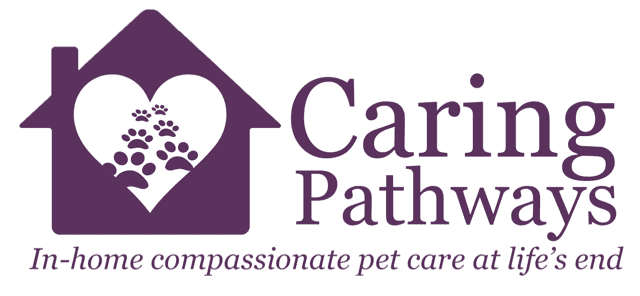Here at Caring Pathways, we want to do more than just provide end-of-life-care for pets. We want to help pet owners keep their pets well for as long as possible by providing them with some safety tips throughout the year. Now that we’re in winter, there are some potential dangers that can await your pet, so consider the list of five winter safety tips below to keep your pet safe.
Antifreeze
Antifreeze is one of the most common winter danger to pets because it’s so commonly used in cars and has a sweet taste, which lures animals to drink it. But antifreeze is highly toxic and can be fatal even in small amounts if ingested. Make sure to clean any antifreeze spills on your driveway and in your garage to protect your pet. Also, consider using a brand that contains propylene glycol instead of ethylene glycol, which is less toxic if accidentally ingested.
Frostbite
Even though most dogs and cats are covered in fur, they can still get frostbite in cold conditions, especially on their ears, paws, and tail. Short-haired breeds are even more at risk, and if the temperatures are cold enough, frostbite can take place in a matter of minutes. To protect your pet, limit their time outdoors on frigid days, and consider giving them a couple pairs of pet booties or a sweater to provide them with some extra warmth.
Car Engines
When temperatures drop, feral cats and other outdoor animals are known to find warmth and shelter under the hoods of cars, near the engines. While this may seem like a safe place to an animal, if the car is started, that animal can be severely injured or even killed. Keep this in mind if you’ve noticed any stray cats in your neighborhood. You can save an animal’s life by simply getting in the habit of checking under your hood or honking your horn to alert any animals that may be sleeping underneath.
Rodenticides
Another place that animals may end up in their search for warmth is basements. This is common for mice and other rodents. If you suspect that you have a rodent problem in your home, think twice about using rodenticide (rat poison); your pet might find it and eat it before the targeted rodent does. Explore more humane ways of ridding your home of rodents, such as using essential peppermint oil or simply adopting a cat—if you don’t already have one.
Sidewalk Salt
While ice-melt products are sometimes inevitable for Colorado’s winters, did you know they can be dangerous to pets? The chemicals in these products can irritate the paw pads, causing a burning sensation. If you recently salted your sidewalk and driveway, or if you’ll be taking your pet for a walk on a sidewalk or bike trail, use caution. Either have your pet wear pet booties or use a paw protection wax, or simply use a pet-friendly ice-melting formula.
If ever your pet is in need of emergency care, contact your family veterinarian or emergency veterinarian immediately. And remember, Caring Pathways is staffed with a team of experienced, compassionate veterinarians who can answer any questions you have about your pet’s care. Just give us a call at 720-287-2553.

